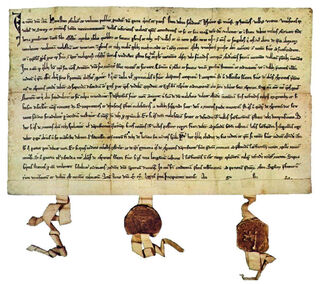
The Charter documents the Eternal Alliance of the League of the Three Forest Cantons, the union of three cantons in what is now central Switzerland. It is dated to early August 1291, which in the 20th century inspired the date of Swiss National Day, 1 August. Written in Latin, the Charter makes reference to a previous (lost or unwritten) pact.
The Alliance was concluded between the people of the alpine areas of Uri, Schwyz and Unterwalden (homines vallis Uranie universitasque vallis de Switz ac communitas hominum Intramontanorum Vallis Inferioris). The participants are referred to as conspirati and (synonymously) coniurati, traditionally translated in German as "Eidgenossen" (and in English as "Confederates").
The Charter was probably intended to ensure legal certainty after the death of Rudolf I of Habsburg on 15 July 1291. The first two paragraphs commit all three communities to the joint defense of the three valleys. The remainder of the Charter concerns judicial matters: It calls for arbitration in the case of conflicts, rejects foreign judges, establishes the death penalty for murderers and exile for arsonists, and commands obedience to judges and judicial verdicts.
Here is the complete text translated to English:
IN THE NAME OF GOD - AMEN. Honor and the public weal are promoted when leagues are concluded for the proper establishment of quiet and peace.
Therefore, know all men, that the people of the valley of Uri, the democracy of the valley of Schwyz, and the community of the Lower Valley of Unterwalden, seeing the malice of the age, in order that they may better defend themselves, and their own, and better preserve them in proper condition, have promised in good faith to assist each other with aid, with every counsel and every favor, with person and goods, within the valley and without, with might and main, against one and all, who may inflict upon any one of them any violence, molestation or injury, or may plot any evil against their persons or goods. And in every case each community has promised to succor the other when necessary, at its own expense, as far as needed in order to withstand the attacks of evil-doers, and to avenge injuries; to this end they have sworn a solemn oath to keep this without guile, and to renew by these presents the ancient form of the league, also confirmed by an oath.
Yet in such a manner that every man, according to his rank, shall obey and serve his overlord as it behooves him.
We have also vowed, decreed and ordained in common council and by unanimous consent, that we will accept or receive no judge in the aforesaid valleys, who shall have obtained his office for any price, or for money in any way whatever, or one who shall not be a native or a resident with us. But if dissension shall arise between any of the Eidgenossen (confederates; Eid = oath, Genosse = fellow, comrade), the most prudent amongst the confederates shall come forth to settle the difficulty between the parties, as shall seem right to them; and whichever party rejects their verdict shall be held an adversary by the other confederates.
Furthermore it has been established between them that he who deliberately kills another without provocation, shall, if caught, lose his life, as his wicked guilt requires, unless he be able to prove his innocence of said crime; and if perchance he escape, let him never return. Those who conceal and protect said criminal shall be banished from the valley, until they be expressly recalled by the confederates.
But if any one of the confederates, by day, or in the silence of the night, shall maliciously injure another by fire, he shall never again be considered a fellow-countryman. If any man protect and defend the said evil-doer, he shall render satisfaction to the one who has suffered damage.
Furthermore, if any one of the confederates shall spoil another of his goods, or injure him in any way, the goods of the guilty one, if recovered within the valleys, shall be seized in order to pay damages to the injured person, according to justice.
Furthermore, no man shall seize another's goods for debt, unless he be evidently his debtor or surety, and this shall only be done with the special permission of his judge.
Moreover, every man shall obey his judge, and if necessary, must himself indicate the judge in the valley, before whom he ought properly to appear. And if any one rebels against a verdict, and, in consequence of his obstinacy, any one of the confederates is injured, all the confederates are bound to compel the culprit to give satisfaction.
But if war or discord arise amongst any of the confederates and one party of the disputants refuse to accept the verdict of the judge or to give satisfaction, the confederates are bound to defend the other party.
The above-written statutes, decreed for the common welfare and benefit, shall endure forever, God willing. In testimony of which, at the request of the aforesaid parties, the present charter has been drawn up and confirmed with the seals of the aforesaid three communities and valleys.
So done in the year of the Lord 1291 at the beginning of the month of August.
 RSS Feed
RSS Feed